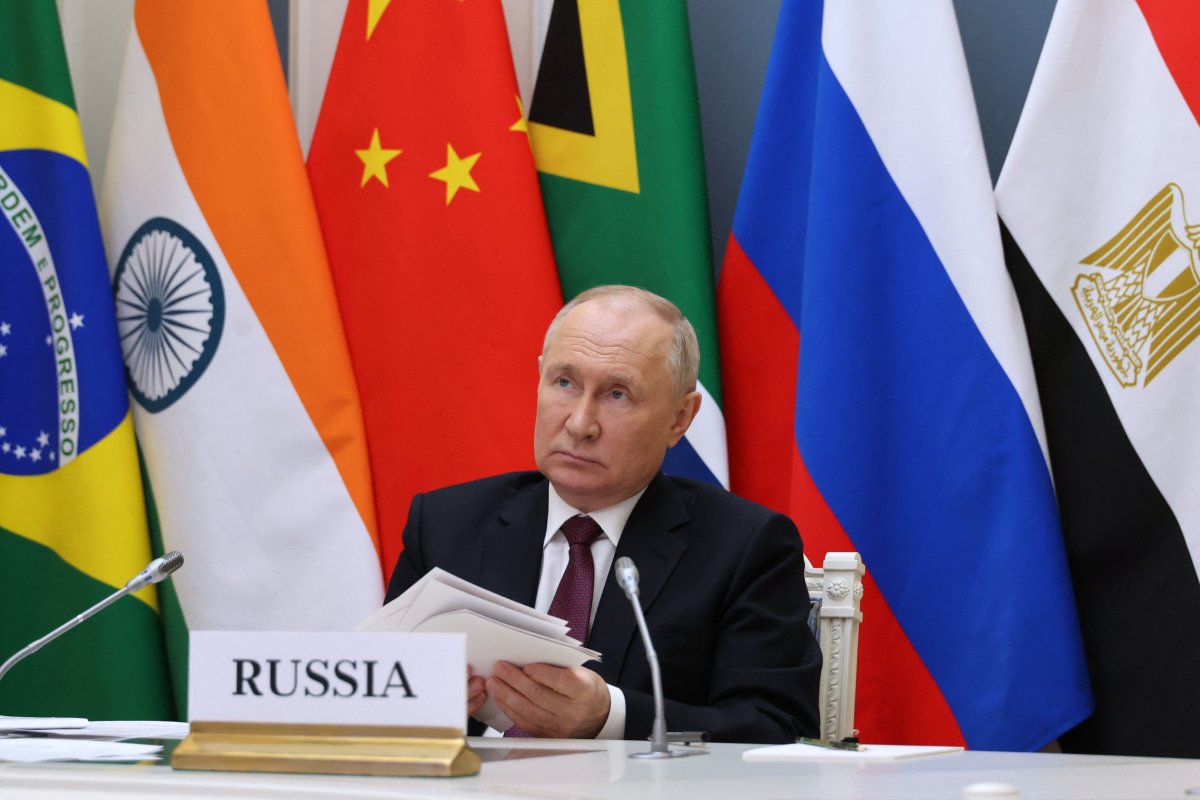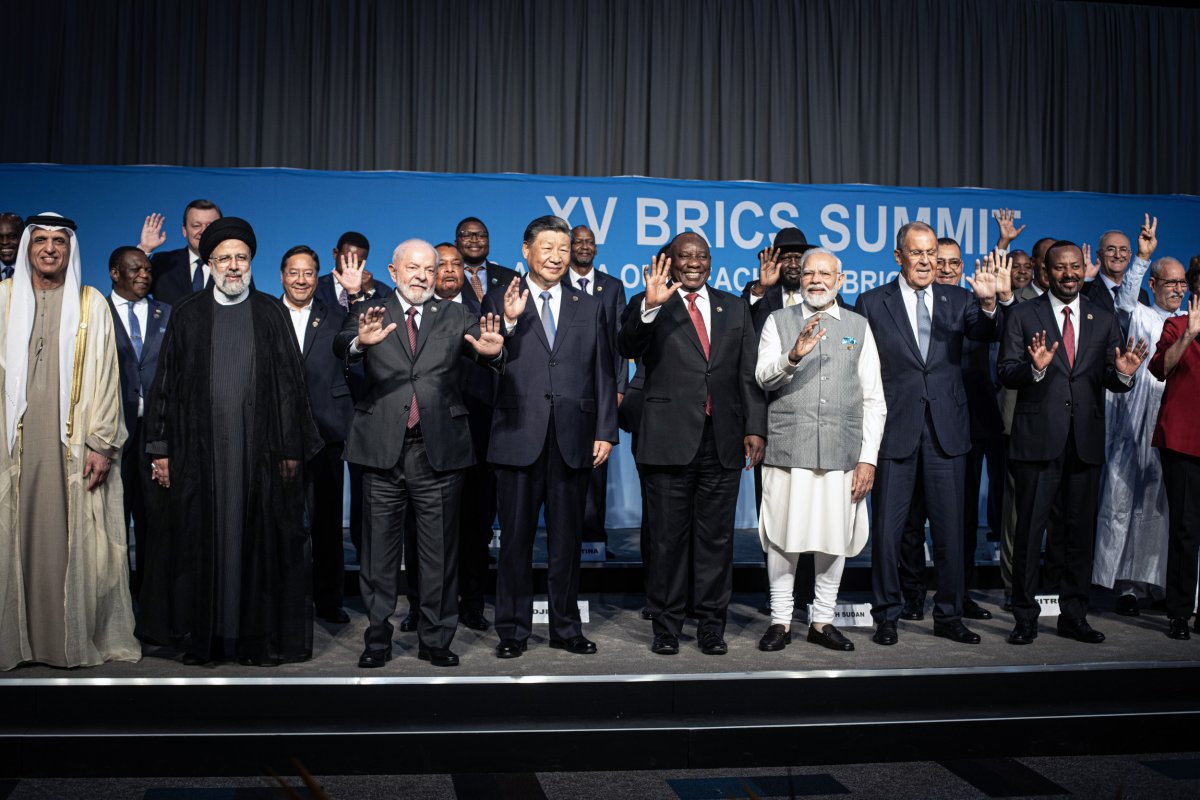Russia is looking to use its leadership of a bloc containing some of the world's most powerful nations to shift the international order away from Western dominance.
With new influential nations having recently joined BRICS and more looking to sign up to the emerging bloc, Russia's envoy to the United States told Newsweek that the group's ambitious push to overcome differing geopolitical outlooks and press forward toward a common agenda is already underway in spite of unique challenges Moscow faces.
"The year 2024 is a landmark year for the foreign policy of the Russian Federation," Russian Ambassador Anatoly Antonov told Newsweek. "Despite persistent attempts by a number of states to isolate our country or, at least, present such a picture that key foreign nations are fencing off from Moscow, de facto the situation is completely different."
"Advancement of the international community towards genuine multipolarity is gaining momentum," Antonov added. "And Russia is not a mere witness to these trends, but an active participant in this much-needed process."

Expanding Scope and Membership
BRICS was first established 15 years ago as BRIC among Brazil, Russia, India and China, with South Africa joining in 2010. Initially focused largely on economic affairs, BRICS has increasingly taken on a geopolitical element.
This year, as Russia took the helm of the bloc's rotating chairmanship under the banner of "Strengthening Multilateralism for Equitable Global Development and Security," BRICS accepted five new members—Egypt, Ethiopia, Iran, Saudi Arabia and the United Arab Emirates—in line with last year's historic summit in Johannesburg. Argentina was also set to join but rescinded its accession after elections ushered in a major political shift at home.
As Russia prepares to host the next BRICS summit in Kazen this October, a growing list of countries—almost three dozen by Antonov's estimate—are also looking to become members or partners of the bloc. Now, according to the senior Russian diplomat, Moscow's goal "is to enhance and bolster BRICS' role and weight as a center of gravity for countries seeking to pursue an independent foreign policy course."
"For those who do not want to live under someone else's dictate, and aspire to be on friendly terms with the rest of the world, trading and interacting on equal footing," Antonov said.
"For those, to whom the fundamental principles of the group—sovereign equality, mutual and consensual consideration of interests, desire to shape a fair model of global markets, search for collective answers to the current challenges—are not an empty word."
Taking on the U.S. Dollar
This quest has taken on many forms, such as joint political, business and science endeavors. Perhaps most notably, however, BRICS has set out to reduce the influence of the U.S. dollar in world trade and establish new mechanisms of development assistance to countries seeking an alternative to Western-led institutions such as the International Monetary Fund and the World Bank.
Among the most important tools in this regard is the BRICS New Development Bank, headquartered in Shanghai and currently led by former Brazilian President Dilma Rousseff. Through this multilateral financial institution and efforts to emphasize trade among members using national currencies, BRICS has set out to address challenges, such as high transaction costs, that are associated with a U.S. dollar-dominated environment.
"Even politically affiliated experts acknowledge de facto monopolization of the current financial and economic infrastructure," Antonov said. "Such a situation does not in any way contribute to the global financial stability. And most importantly, it undermines its own credibility by creating new crises and hindering genuine decolonization of the world economy."
"A situation when a few countries feel entitled to dictate their will to others, threatening to cut off access to global economic processes, confiscate their assets, and ruin [the] well-being of ordinary citizens, is fundamentally wrong and inconsistent with prevailing tendencies," he added. "The overwhelming majority of states have realized the harmfulness of such approaches."
As such, Antonov asserted that Russia and its partners "remain fully committed to uniting our resources to design new financial instruments independent from political trends in Washington, Brussels or London, where authorities are ready to neglect national legislative provisions and postulates of international law in order to punish insufficiently loyal partners."
"It is unacceptable when the debt burden of developing countries—or rather, their ability to get out of the debt trap they were forced into over decades—is at the 'mercy' of the central banks of the United States and Europe," he said.
Newsweek has reached out to the U.S. State Department for comment.

Filling in the Gaps
Russia would undoubtedly benefit from such an approach given the growing array of Western-led sanctions imposed on the country over the past two years since it launched a war against neighboring Ukraine. These moves also dovetail with the Kremlin's broader strategy of bolstering ties with developing nations, particularly in Africa, where the United States has struggled to exert its own influence.
But Moscow is not alone in seeking independent trade mechanisms amid widening economic restrictions. Beyond U.S. rivals China and Iran, a growing chorus of nations, including India and Saudi Arabia, have expressed concern over the effects of sanctions, primarily those imposed by the U.S., on the world economy.
BRICS' efforts have also been met with a degree of skepticism, though. The U.S. retains a sizable lead against top competitors such as the euro, yen, pound sterling and renminbi as the world's largest reserve currency. And though mutual goals may exist among BRICS member states, they differ drastically in their respective geopolitical outlooks and interests.
Global conflicts have proven a test for BRICS' broader scope, as well.
While member states have largely remained neutral in their official stances toward the war in Ukraine, controversy over a warrant for Russian President Vladimir Putin's arrest issued by the International Criminal Court in relation to alleged war crimes loomed over the last BRICS summit in South Africa. Putin ultimately opted to attend the event virtually.
The group also convened an extraordinary summit last November to address the war between Israel and Hamas in Gaza. As chair at the time, South African President Cyril Ramaphosa condemned attacks on civilians coming from both sides, but no joint statement was released.
Antonov, for his part, downplayed reservations toward the bloc's capacity to carry out its pioneering mission, asserting that, "if there is a will, there is a way."
"The very fact that a number of U.S. journalists cast doubt on the ability of China and India, Saudi Arabia and Iran to work together, only confirms a unique character and power of BRICS," Antonov said. "When sneering at Argentina's 'recusal,' they ignore that there were neither criticism nor threats towards Buenos Aires from other members of the organization, only a confirmation of the readiness to cooperate in any convenient form."
"And this is the key idea behind the new world order," he added, "searching for answers to challenges on a collective basis, without imposing alien values and influences."
A New Kind of Approach
Even as BRICS' challenge to the existing order grows bolder with the addition of new initiatives and member states, those behind the bloc have long argued that its mandate did not amount to a confrontational approach with the U.S. or others.
Antonov, too, emphasized that BRICS' priorities "in no way imply that member-states see the value of the format in opposing themselves to the collective West."
"The essence of BRICS doesn't lie in confrontation, but in promotion of a positive and unifying agenda," Antonov said. "Nobody exerts pressure on particular states to join the group. It is all driven by their own plans and intentions."
These plans will be on full display as Russia organizes more than 200 events in the leadup to the summit in Kazen, with a primary focus on politics and security, economics and finance and cultural and humanitarian dialogue. In this regard, Antonov expressed confidence that Russia's chairmanship "will contribute to practical results" in all these areas and would "provide an additional impetus to cooperation within the BRICS framework."
"This, in turn, will strengthen the voice of nations, which are focused on defending true national interests and choosing their own path of development," Antonov said. "Russia will bring together representatives of different cultures and civilizations, countries with different economic and political systems."
"However, the discussions will not be focused on differences, but on the search for common ground on the principal of consensus and taking into account each other's positions," he added. "Isn't that the essence of genuine multipolarity?"
Uncommon Knowledge
Newsweek is committed to challenging conventional wisdom and finding connections in the search for common ground.
Newsweek is committed to challenging conventional wisdom and finding connections in the search for common ground.
About the writer
Based in his hometown of Staten Island, New York City, Tom O'Connor is an award-winning Senior Writer of Foreign Policy ... Read more
To read how Newsweek uses AI as a newsroom tool, Click here.








